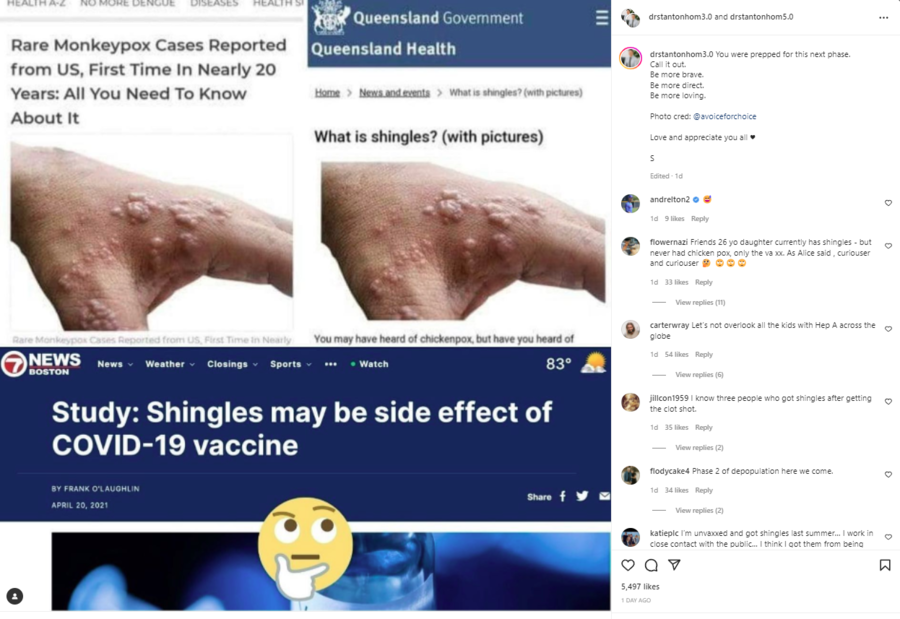Fact Check: NO Evidence COVID-19 Vaccines Cause Monkeypox, Shingles

Do COVID-19 vaccines cause monkeypox and shingles? No, that’s not true: There’s no evidence that either disease is caused by the shot for COVID. Both monkeypox and shingles are caused by specific viruses, neither of which are included in COVID-19 vaccines. But, even if the viruses were the same, the COVID shots still couldn’t cause infection.
“Because none of the authorized COVID-19 vaccines in the United States contain the live virus that causes COVID-19, the vaccine cannot make you sick with COVID-19,” the Centers for Disease Control and Prevention (CDC) said.
The claims appear in an Instagram post on May 22, 2022, under the title “You were prepped for this next phase.” It opened:
Call it out.
Be more brave.
Be more direct.
Be more loving. …Love and appreciate you all ♥️
This is what the post looked like on Instagram on May 24, 2022:
(Source: Instagram screenshot taken on Mon May 24 16:18:59 2022 UTC)
If A = B and B = C, then A = C
The Instagram post falsely equates three things — images from a Queensland, Australia, government website on shingles, an article from a health site in India on monkeypox that uses the same image as the shingles image used on the Queensland site and a news report on a limited study saying shingles may be a side effect of the COVID-19 vaccine. The post is saying that if A = B and B = C, then monkeypox and shingles are caused by COVID vaccines.
The post tries to prove the transitive property by visually linking shingles with monkeypox. The image from Queensland Health shows a photo of a rash purportedly caused by shingles. The Indian website, thehealthsite.com, used the same picture to illustrate a story on monkeypox. Monkeypox and shingles are not the same things, even though the double use of the same image suggests they are. In a May 24, 2022, email to Lead Stories, the CDC said:
There is no current connection between COVID-19 Vaccines and orthopoxviral infections, such as monkeypox, smallpox, and shingles. COVID-19 vaccination helps protect people from getting COVID-19. Some people have side effects from the vaccine, which are normal signs that their body is building protection. These side effects may affect their ability to do daily activities, but they should go away in a few days. Some people have no side effects, and allergic reactions are rare.
The study
That leaves the study from a WHDH-TV news article with the headline: “Study: Shingles may be side effect of COVID-19 vaccine.” The very limited study involved six people with autoimmune inflammatory rheumatic diseases (AIIRD), not the general population. The findings were published in the British Society of Rheumatology in April 2021:
Epidemiologic studies on the safety of the mRNA-based COVID-19 vaccines in patients with AIIRD are needed to clarify the association between the BNT162b2 mRNA [Pfizer] vaccination and reactivation of zoster [the virus that causes shingles].
Bottom line: The study represents at most a tiny fraction of the hundreds of millions of people receiving the shots.
In a May 24, 2022, email to Lead Stories, Pfizer Global Media Relations said:
The COVID-19 vaccine does not contain any live virus and is completely synthetic. Furthermore, it does not shed any virus transmitting from human to human. With monkeypox, human-to-human transmission occurs through close contact with infectious material from skin lesions of an infected person, through respiratory droplets in prolonged face-to-face contact, and through fomites. Shingles is caused by varicella zoster virus (VZV), the same virus that causes chickenpox. After a person recovers from chickenpox, the virus stays dormant (inactive) in their body. The virus can reactivate later, causing shingles. If you have shingles, direct contact with the fluid from your rash blisters can spread VZV to people who have never had chickenpox or never received the chickenpox vaccine. If they get infected, they will develop chickenpox, not shingles. They could then develop shingles later in life. People with shingles cannot spread the virus before their rash blisters appear or after the rash crusts.
This article has been archived for your research. The original version from Lead Stories can be found here.



